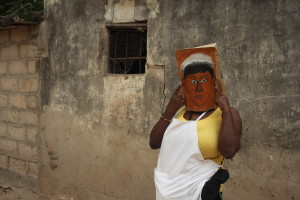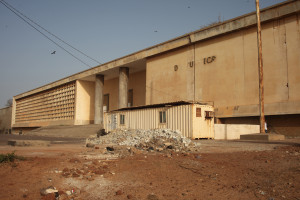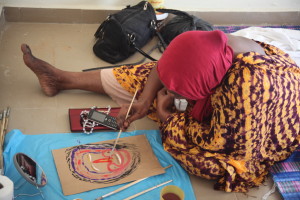Collapse of Justice - research trip to Senegal
Jimini Hignett's work constitutes a critical reflection on social issues particularly related to inequality and exclusion. She spent a month in Senegal at the beginning of this year, for her research project Collapse of Justice, exploring the stories of women in prostitution and prison.

One disturbing piece of information about Senegal caught my attention and has continued to gnaw: that the majority of women are behind bars in women's prisons for prostitution-related "crimes," or for infanticide - killing their baby. Events that are connected in many ways, poverty and lack of women's rights being the most obvious.
For some time now I have been working with the topic of prostitution. This is especially relevant now because a growing number of countries are considering implementing the "Swedish model," which penalizes those who buy sex, as opposed to those who sell it. I consider prostitution to be a topic that cannot be separated from gender, race and class politics, and I explore its relationship to contemporary consumerism, and the similarities and differences in different countries, over time.
Much of my work revolves around the life stories of women, situations of prostitution, and Senegal is special because it is the only country in Africa, and the only low-income country, where prostitution is legal and regulated by health policies. Despite the fact that it is largely Muslim here, and prostituted women suffer from intense stigma, there are a number of, amazingly visible groups, who are fighting to create other options for women in prostitution. This makes it a little more accessible to me. I hope to work with these groups, and with women in prison. The voices of prostituted women, especially those in Africa, are still underheard on global stages.
I was invited by a Senegalese NGO, Tostan, to join Project Prison, which targets women who have recently come out of prison and helps them reintegrate into their families and village society. It is in Diourbel, a small town in the interior, four hours away by cab. It starts tomorrow and will last ten days.
 First here in Dakar to arrange all sorts of things: Mamí is going to interpret, Abdu is going to transcribe the audio of Wolophone interviews, and Niokhobaye will arrange access to the prison, but so far, is being sent endlessly from closet to wall. (Outside his office is a basketball court on which a group of 12 men in dark suits with ties. Led by a command-distributing man in a tracksuit, they perform a James Bond-like choreography - intricate steps, turns, pointing their guns. Only one of the men has a real gun; the others pull their fingers from their pockets and point them on command at the small group of audience members who stand admiring the spectacle. Are they actors, dancers?... "No, security guards.") I also meet with Lala, founder of And Soppeku, a group that educates (often illiterate) women in prostitution about their rights, and about HIV/AIDS. Lala is so enthusiastic about my project that she offers herself for an interview, and right away! We talk on until it gets dark.
First here in Dakar to arrange all sorts of things: Mamí is going to interpret, Abdu is going to transcribe the audio of Wolophone interviews, and Niokhobaye will arrange access to the prison, but so far, is being sent endlessly from closet to wall. (Outside his office is a basketball court on which a group of 12 men in dark suits with ties. Led by a command-distributing man in a tracksuit, they perform a James Bond-like choreography - intricate steps, turns, pointing their guns. Only one of the men has a real gun; the others pull their fingers from their pockets and point them on command at the small group of audience members who stand admiring the spectacle. Are they actors, dancers?... "No, security guards.") I also meet with Lala, founder of And Soppeku, a group that educates (often illiterate) women in prostitution about their rights, and about HIV/AIDS. Lala is so enthusiastic about my project that she offers herself for an interview, and right away! We talk on until it gets dark.
Ten women who have recently been released from three different prisons are participating in Project Prison. They are given a course that teaches them how to turn fruit and vegetables into preserves and syrup, so that later, when it is out of season, they can sell it at a profit. When I arrive they are boiling a huge pan of orange syrup, peeling ginger for ginger drink, and making hot chili sauce. I don't want to intrude with my camera so I only shoot pictures of their working hands.
The course should give them more independence when they return to their villages. Women who have been in prison are heavily stigmatized and thus have a very difficult time. Most have been detained for infanticide, a term that covers not only killing your (newborn) baby, but also having an abortion. Many of these women were even reported to the police by neighbors or family members after having a miscarriage. Almost all of them are illiterate and most of them spent years in pre-trial detention because they had neither the knowledge nor the means to hire a lawyer. Files were lost, and sometimes it took five years before they were arraigned and the judge finally declared them innocent and sent them home. Only a few of the women speak French, the rest only Wolof. Aïssatou, the tireless local founder of this project, explains my work to the group, and arranges for me to record the women's stories. The accounts - forced marriages; religion-approved polygamy; rapes by uncles, cousins or maraboets; newborn babies abandoned - as well as how they were turned away by family and village, are heartbreaking. Aïssatou interprets, and it makes her cry.
Besides religion, magic often appears in their stories. I have to get very used to it. On the route to the Tostan building is a road where all sorts of strange items are displayed for sale - horns or legs of various animals, teeth, pieces of fur, dry bats or other creatures, shells or odd bits of wood. Witchcraft has a strong presence here. Before leaving, I tried incredibly hard to read up. Downloaded a mountain of articles - on religion, justice, but especially on women's rights and the role of women in Senegalese society. Statistics, literature, books by Senegalese authors, especially female ones... but once here, everything seems even more complex.
I also invite the women to paint a mask. These are self-portraits painted on a brown paper bag. With a mask, they remain anonymous in the photograph. The pictures with masks have multiple layers - they indicate how the women see themselves; they say something about their clumsiness with a brush; in many African countries, a mask possesses magical powers and confers special power on the wearer, but they also recall images of prisoners with a bag over their heads; and, very importantly, because we cannot see the women but they "see" us, the standard direction of gaze is reversed.
The diplomas awarded at the end of the course week by the director of the prison will, for many of the women, be the first diploma they have ever received. A happy, but also a sad, moment - now they must return to the rejections and cruelties of their regular lives. For some, this was the most enjoyable week of their lives. Very special that I got to share it with them.
 Back in Dakar, beautiful evening light, I go to take pictures of the Ancien Palais de Justice - the old palace of justice. Put down in the years just before Senegalese independence, it is built on a rocky plateau, a peninsula that is slowly crumbling which began to cause large cracks in the building, which prompted the rapid relocation of the court to a new home. Last time I was here, the building had been abandoned for many years, and a guard was supposed to deter visitors. But as an artist, I was supposed to be harmless, and was able to surreptitiously photograph the dilapidated and crumbling interior - stacks of documents collecting thick layers of dust and slowly rotting away, infested by insects and rodents. The image of the abandoned courthouse and the artifacts of justice left behind, reflect the way these underprivileged women were left to fend for themselves. The photographs are an apt metaphor for the legal and ethical (in)justices regarding the women - a literal Collapse of Justice. The building appears to have been emptied in the meantime. A security guard tells us that the piles of documents were simply thrown on a pyre. The sanitized building is to be used for, how ironic can it be...an art event...the Dakart Biennial.
Back in Dakar, beautiful evening light, I go to take pictures of the Ancien Palais de Justice - the old palace of justice. Put down in the years just before Senegalese independence, it is built on a rocky plateau, a peninsula that is slowly crumbling which began to cause large cracks in the building, which prompted the rapid relocation of the court to a new home. Last time I was here, the building had been abandoned for many years, and a guard was supposed to deter visitors. But as an artist, I was supposed to be harmless, and was able to surreptitiously photograph the dilapidated and crumbling interior - stacks of documents collecting thick layers of dust and slowly rotting away, infested by insects and rodents. The image of the abandoned courthouse and the artifacts of justice left behind, reflect the way these underprivileged women were left to fend for themselves. The photographs are an apt metaphor for the legal and ethical (in)justices regarding the women - a literal Collapse of Justice. The building appears to have been emptied in the meantime. A security guard tells us that the piles of documents were simply thrown on a pyre. The sanitized building is to be used for, how ironic can it be...an art event...the Dakart Biennial.
Driven by Lala, women who are forced by fate to sell their bodies to feed their children visit me daily. My research focuses on the circumstances that bring women to prostitution, not the gruesome details of what happens behind closed doors. They paint masks and share their stories of personal disaster, and crippling poverty. What incredible resilience these women must have to survive all the obstacles in their path. What they have in common with the prostituted women I interviewed in Europe and South America is a persistent appropriation of class privilege and male privilege. But it strikes me that none of the women here are forced to work by a man, either a partner or a pimp. They are even staggered when I ask - there is no such thing here. Officially, they would fit perfectly into the Dutch ideal of the independent sex worker who has autonomously 'chosen' to go into prostitution. Strange then that none of these women really chooses it, it's like an absolute emergency response due to lack of other options. Perhaps it is time to seriously ask ourselves whether the Dutch 'ideal' is not just a misnomer.
 During the last week, some special interviews: The success story of a woman whose prison sentence gave her a way out, a chance at an education, and more independence when she was released. She paints and batiks fabrics and now teaches other ex-convicts. And in the suburb of Pikine, an interview with a woman from the Lebou tribe who performs rituals for good fishing, or to calm the sea - throwing kauri shells indicate to her what sacrifices should be made. She tells of the ceremonies to appease the sea gods, and how this gift of being in touch with the spirits is passed down from generation to generation - the little knife sitting next to her becomes her successor. Beautiful - Girl-Power in this country where most women seem to have so little power. The very last day seems like a marathon; conversations with four different women from AWA, another association of women in prostitution.
During the last week, some special interviews: The success story of a woman whose prison sentence gave her a way out, a chance at an education, and more independence when she was released. She paints and batiks fabrics and now teaches other ex-convicts. And in the suburb of Pikine, an interview with a woman from the Lebou tribe who performs rituals for good fishing, or to calm the sea - throwing kauri shells indicate to her what sacrifices should be made. She tells of the ceremonies to appease the sea gods, and how this gift of being in touch with the spirits is passed down from generation to generation - the little knife sitting next to her becomes her successor. Beautiful - Girl-Power in this country where most women seem to have so little power. The very last day seems like a marathon; conversations with four different women from AWA, another association of women in prostitution.
Permission for prison I did not get, but in these 27 days, I interviewed a total of 26 women. Heard a lot of life stories, but the context, this society with all its complexity, still feels elusive.
Back in Amsterdam, an ordered book is on the mat at home, Black Sisters Speak Out - Feminism and Oppression in Black Africa. Should have read before my trip.



